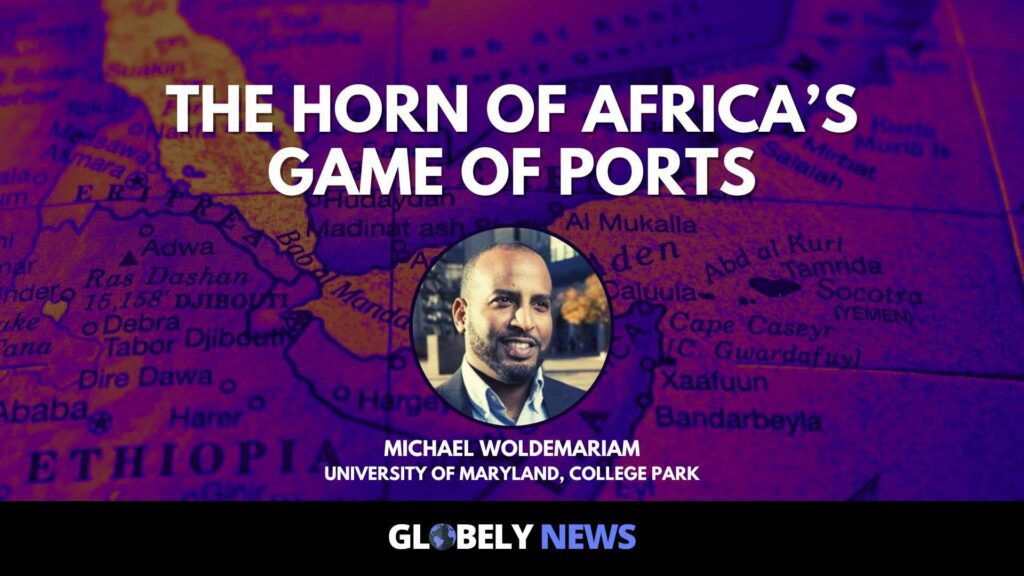“The Horn of Africa has always been a geopolitical hot zone,” says University of Maryland Professor Michael Woldemariam in the latest episode of our flagship global affairs podcast, The Pivot. The recent maritime access agreement between Ethiopia and the breakaway region of Somaliland is a testament to the region’s volatility.
Listen to this episode of The Pivot on Amazon Music, Apple Podcasts, Audacy, Google Podcasts, iHeart Radio, Pandora, Pocket Casts, Spotify, TuneIn Radio, or YouTube Music.
A memorandum of understanding signed on January 1 between landlocked Ethiopia and Somaliland, according to some reports, would provide the former with access to a naval base and port in exchange for recognition of this breakaway region of Somalia.
That move was followed months later by agreements between the Federal Government of Somalia and Turkey to build its naval forces and explore offshore oil and gas reserves. Somalia is also home to Turkey’s largest overseas military base.
Great and Regional Powers Compete in the Horn of Africa
The Turkish role reflects what makes this era of geopolitical competition in the Horn of Africa different in Woldemariam’s view: the strong role played by middle powers in the region. In addition to Turkey, there’s also Saudi Arabia and the United Arab Emirates, which have operated bases in neighboring Eritrea and Djibouti.
Great powers, like during the Cold War, also have a large footprint in the region. Djibouti, a country roughly the size of New Jersey, hosts many foreign military outposts, including an American base and China’s first overseas base.
A quick look at a map explains why the Horn of Africa is so important: it is a prime geopolitical location.
The Horn of Africa, which consists of Ethiopia, Djibouti, Eritrea, and Somalia, sits along the Red Sea and the Gulf of Aden, across from the Arabian Peninsula, and along the vital trade route that connects Europe with Asia and southern Africa — a trade route that has come under attack in recent months by Houthi militants. Djibouti is located right at the Bab el-Mandeb chokepoint.
Ethiopia’s Problem of Geography
Ethiopia is the latest actor to join the fray in the Horn of Africa’s game of ports. Its search for access to sea is driven by its problem of geography. It’s the world’s largest landlocked country by population and depends on Djibouti for transporting roughly 90 percent of its international trade.
Ethiopia’s reliance on Djibouti stems from its loss of Eritrea, which broke away in 1993 after a long civil war. In 1998, Ethiopia’s access to Eritrea’s Assab port was cut off when the two countries went to war.
The agreement signed between Ethiopia and Somaliland is controversial because the latter isn’t recognized as an independent country. Naturally, it triggered an angry response from the central government in Mogadishu.
As tensions rise between Ethiopia and the Federal Government of Somalia, there are concerns that Addis Ababa is adopting a more belligerent posture toward its neighbors.
Last year, Prime Minister Abiy Ahmed reportedly told a group of businessmen that his country would use force if it failed to obtain access to a new port through peaceful means.
Ethiopia’s Power Paradox
But Ethiopia’s quest for sea access is also driven by a belief that it should be a regional hegemon. Woldemariam says successive regimes in Ethiopia have agreed that the country “should be the preeminent power in the Horn of Africa region” by virtue of its size, “historic diplomatic weight,” and other factors.
And yet, as Woldemariam points out, alongside its ambitions, Ethiopia is also an “insecure and vulnerable state” beset by internal challenges — as the recent Tigray war showed — and troubled relations with its neighbors.
Ethiopia’s strategic position is in some ways paradoxical: it possesses many attributes of national power, including a large population, and yet it is landlocked — a real economic and strategic vulnerability.
“Sustainable, reliable port access,” as Woldemariam notes, is key for Addis Ababa not just from a national security perspective, but also to keep transport costs down and sustain its export-led model of growth.
Episode Description
University of Maryland Professor Michael Woldemariam joins host Arif Rafiq to discuss the recent maritime access agreement between Ethiopia and the breakaway region of Somaliland. They address landlocked Ethiopia’s problem of geography, its regional aspirations, the challenges of federalism and fragmentation in Somalia and Ethiopia, and the contestation between great and regional powers, including the U.S. and China, Saudi Arabia, the UAE, and Turkey.
Guest Bio
Michael Woldemariam is an associate professor in the School of Public Policy at the University of Maryland, College Park. He’s also a senior fellow at the Center for International & Security Studies at Maryland.
Dr. Woldemariam’s teaching and research interests are in African security studies, with a particular focus on armed conflict in the Horn of Africa.
His first book, “Insurgent Fragmentation in the Horn of Africa: Rebellion and Its Discontents,” was published by Cambridge University Press in 2018. He received a Ph.D. from Princeton University.
Arif Rafiq is the editor of Globely News. Rafiq has contributed commentary and analysis on global issues for publications such as Foreign Affairs, Foreign Policy, the New Republic, the New York Times, and POLITICO Magazine.
He has appeared on numerous broadcast outlets, including Al Jazeera English, the BBC World Service, CNN International, and National Public Radio.
Source link : https://globelynews.com/africa/ethiopia-somaliland-horn-africa-game-of-ports/
Author :
Publish date : 2024-03-18 03:00:00
Copyright for syndicated content belongs to the linked Source.
